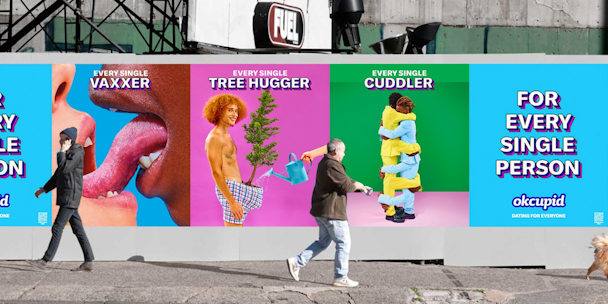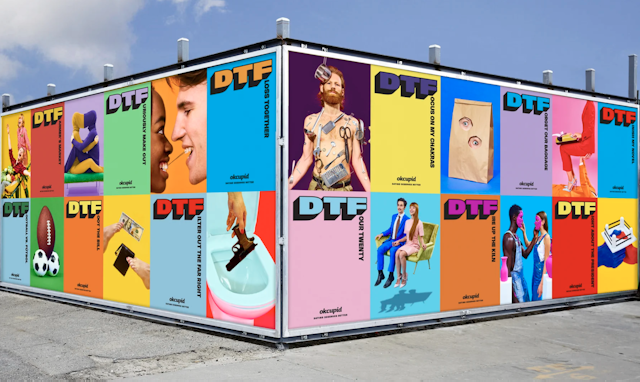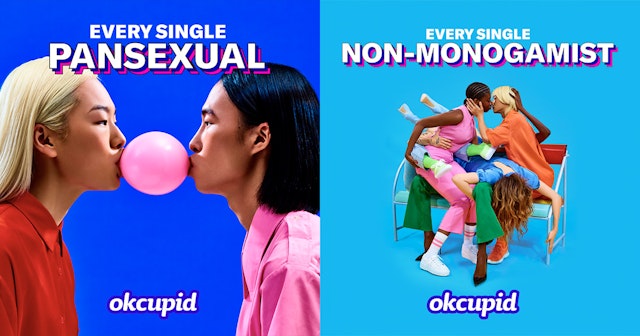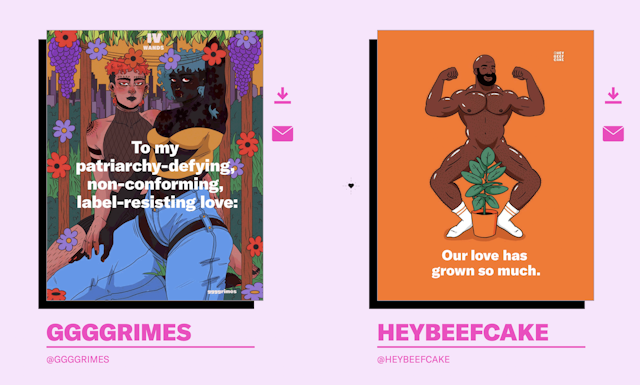How OkCupid transformed from an online quiz site to a hot, radically inclusive dating app
Once a personality-based matchmaking site, OkCupid funneled dollars into product development, user experience and a brazen new approach to marketing. For The Drum's latest Deep Dive we look at how the platform carved out a niche for itself as the preeminent choice for daters who want to talk social and political issues..

OkCupid is all-in on inclusivity
Who says it’s taboo to talk politics and religion on a first date? OkCupid is proof that the old adage no longer holds true. The hot dating app has been on fire this year after overcoming a few unsexy growing pains.
Founded in 2004 by Chris Coyne, Christian Rudder, Sam Yagan and Max Krohn — the Harvard students who also created SparkNotes — OkCupid has its roots in what was once called SparkMatch. The platform allowed users to connect based on the results of a personality assessment similar to the popularized Myers-Briggs Type Indicator. After selling SparkMatch to Barnes & Noble, the team built what is now OkCupid. In 2011, they sold the business to InterActiveCorp (IAC), the holding company that owns Match Group. The group owns a number of popular dating and networking platforms including Tinder, Hinge and Match.com.
As smartphone adoption skyrocketed and online dating went mobile, OkCupid was among the first digital dating platforms to launch an effective, user-friendly mobile version. The platform retained its focus on getting users to ‘match on what matters’ — the platform’s functionality and philosophy were both rooted in the principle of encouraging singles to choose potential partners based on what’s most important to them.
Despite the platform’s advances, the brand was tired and lacked freshness. Its narrative and image hadn’t evolved much since its founding. As a result, the platform was losing potential users to newcomers and sister brands like Tinder, which had come on the scene in 2012 and appealed to younger, hookup-focused users.
Recognizing it was time to get more aggressive, OkCupid appointed its first global chief marketing officer in 2017. By the time Melissa Hobley, a former Walgreens executive, took the post, OkCupid had already amassed a massive user base. But it needed a new approach for cutting through the noise.
“Dating apps are a category a little bit like the nightlife scene — [people are looking for] what’s the coolest, newest, latest,” Hobley tells The Drum. “And when you’ve been around a long time and you have been out there telling the story of why this is a good place to meet great people, then people are left to their own devices to develop that perception. So OKCupid definitely had some perception issues, especially with younger daters. People didn’t know what was interesting about the product and about that experience.”
‘DTF’ messaging cuts to the chase
OkCupid had never launched a marketing campaign before early 2018, when it unveiled the colorful, unapologetic, Wieden+Kennedy-led ‘DTF’ campaign that gave new meanings to the naughty acronym (for the uninitiated, DTF is internet shorthand for ’down to fuck’).

The company brought on Ariel Charytan as its new chief executive officer in January of 2018 — right as the bold ‘DTF’ campaign was rolling out across the US. Just over a year later, it appointed Marcus Lofthouse as its new chief product officer to help transform the product experience. Meanwhile, Hobley and her team went to work on reinventing the brand’s image. Through it all, the product and the brand both maintained the same central ethos of ‘matching on what matters.’
And ‘matching on what matters’ helped propel the platform into its new, youthful, über-cool, radically inclusive iteration. “All the great things that were true about OKCupid years ago remained — which [have to do with] matching on the things that matter to you,” says Hobley. “But we started telling people about it.”
After the 2016 US presidential election, Hobley says, people — and singles — were more passionate and more vocal about their beliefs than ever before. OkCupid saw an opportunity to help people connect based on their values. “[We saw daters saying’] ‘Hey, hang on, I want my dates’ views on social and political issues. I want to match on those things. I want to feel like it’s okay to say, “Hey, I'm proudly an LGBTQ ally” or “I'm very concerned about the environment, and if you don't believe climate change is real, get the fuck out”’ — swipe left, in other words.”
The app introduced new ways for daters to set their preferences and to signal to potential matches what their values and politics entail. Daters on OkCupid can now select how they identify from more than 20 sexual orientations and over 22 gender options; users can make multiple selections and update them as frequently as they’d like.
The platform has also rolled out ‘badges’ — icons that users can choose to display on their profiles that indicate, for example, that they’re pro-choice or that they believe in combating climate change. In fact, Hobley says, users can select from an expansive list of issues that matter to them — and even rank their priorities — from a long list of issues ranging from reproductive rights and immigration to racial equity and gun control. Of course they can also opt out altogether or choose not to share their leanings with potential matches. OkCupid is the only major dating app on the market that offers users this level of filtering based on social and political values.
An interesting observation the company has made is that climate change is among the most consistently highly-ranked priorities for OkCupid users around the world — not just among the socio-political issues but among all dating-related priorities and values. “Climate change is one of those things that across any issue — like travel, wanting or not wanting kids — becomes one of users’ top three, from Delhi, to Detroit, to Melbourne to Paris.”
Hobley has hitched the brand’s horse to this focus on enabling daters to match with other singles based on any number of issues. It was evidenced in the US market ‘DTF’ campaign, which featured iterations like ‘DTFour Twenty,’ ‘DTFocus On My Chakras,’ ‘DTFight About The President’ and ‘DTFilter Out The Far Right.’ Hobley says launching the provocative campaign was “the scariest thing” she’d ever done in her career.
While the campaign was bold — and even controversial — it was also fun, which worked in the brand’s favor. “OKCupid has set itself apart through its irreverence and not taking things so seriously while the rest of the category searches for meaning — Bumble going larger than dating to networking, Hinge saying it’s there to be deleted and Match focusing almost on marriage potential, not just dating,” Philip Gaughran, business strategy officer at Dentsu America tells The Drum.
A brave new world of dating
About two years ago, the brand began marketing globally. It teamed up with Mekanism to launch its first-ever global campaign, featuring regionally-specific introspective questions paired with engaging animations to get singles thinking about what matters most to them when picking a date or a partner. The ’Ask yourself’ campaign appears to have made a connection: the app has seen significant growth of its user base in new markets around the globe.
And then of course, the pandemic hit and turned dating and social norms on their head. Between March and May of 2020, OkCupid saw a 700% increase in dates, per reporting by Fortune. And while that growth rate was not sustained over the next year and a half, app-based dating remained the standard mode of dating and Match Group recorded record quarter upon record quarter.
Amid the boom, Hobley and her team have shown no sign of slowing. In August 2021, the brand rolled out its newest effort — its irreverent and wildly inclusive ‘Every Single Person’ campaign featuring creative developed by sculptor Maurizio Cattelan and photographer Pierpaolo Ferrari. Made in partnership with Mekanism, the campaign is a natural expression of the brand’s mission to be a platform where everyone is invited to be exactly who they are and vocalize what they believe in. Hobley says that while OkCupid’s campaigns — and especially its ‘Every Single Person’ push, which includes taglines like ’Every single vaxxer’ and ’Every single pansexual’ — have “ruffled some feathers,” they’ve ultimately proved worthwhile and helped the brand establish a strong brand identity and experience in an increasingly competitive market.

Like the ‘DTF’ campaign, the ‘Every Single Person’ campaign offers a level of gleeful lightheartedness — that coexists with the campaign’s genuinely inclusive messaging — that Dentsu’s Gaughran says daters are looking for now more than ever. “After the last two years, people are looking to have fun first. They’re exhausted by following the rules — and everything having such high stakes. OKCupid’s marketing right now is meeting people where they’re at emotionally, and that’s bringing success. It will be interesting to see if they can sustain the momentum as consumer sentiment shifts over the next 12 months.”
Thus far, OkCupid’s ongoing product development and marketing efforts are paying dividends. Hobley says the company’s revenue and app downloads are both up by “double digits.” The brand’s bold ad campaigns and increased publicity have helped it gain huge followings on its social channels — up from its previously “essentially nonexistent” follower counts, per Hobley.
According to branding experts, the key to OkCupid’s success lies as much in the fact that its original model still works and resonates with daters as in its emphasis on users’ socio-political values and its fun and forward marketing.
“Impressively, the company has stuck to its original strategy as the only dating app with thousands of questions for its matching algorithm to make true user connections,” says Annette Sally, executive vice-president at Blue Sky Agency. This commitment, Sally says, has enabled the company to capture a wider demographic, holding onto 45-plus year-old daters while expanding its user base to include a significant share of millennial and gen Z daters, too.
“In essence, OkCupid has created a dynamic recipe for success,” she says. “One: know what you're good at; two: rely on data to inform decisions; three: be clear and consistent in your brand voice. Put it all together and you get a brand that evolves with its users and the times, knows what it is and the service it provides, and most importantly continuously leverages user data to keep customers happy and engaged with the platform.”
Writing the next chapter of its love story
Now, the dating app is eyeing the future. “We have an ongoing effort and commitment to have the best experience of any dating app for all daters, but in particular for daters that are not cis-hetero,” says Hobley. As part of this mission, OkCupid is delving into research on gender identity and sexuality.
Some trends the company is tracking include an unprecedented rise in the percent of daters identifying as pansexual as well as a small but steadily growing portion who are nonmonagamous or polyamorous. “We’ve been on this journey for a while, but we are going even deeper to understand these experiences so we can [offer] a great experience and all the engineering [that’s needed for that to happen]. You’ll see more developments.”
The brand will also continue to lean into political discourse and plans to launch an ad campaign designed to encourage voting around the US midterm elections later this year. The effort will follow its ‘Voters Make Better Lovers’ campaign, which, launched ahead of the 2020 US presidential election, offered a data-driven glimpse into how daters from different states vote on given issues and the link between voting and finding love.

In its latest move, the brand on February 8 launched a set of digital NSFW Valentine’s Day cards for the second consecutive year. The cards are created by a diverse group of artists and include something cheeky for everyone — couples who’ve gotten back together, independent label-rejecting folks, therapy-going lovers, pro-choice advocates and gluten-free adventurers.
At the end of the day, Hobley is proud that the team has earned its rapidly-growing success. “When you’re a giant brand, maybe you're partnering with a big celebrity or a powerhouse musician. We didn’t have those budgets; we didn’t have the dollars to get there quickly. We really had to earn it. So, all of those figures [representing our growth] have been exciting. Our growth outside the US has been really exciting [and we’ve gained that because] what we are offering resonates, whether you're Israeli, German, Australian, Indonesian or Indian, you want to match on what matters to you.”

